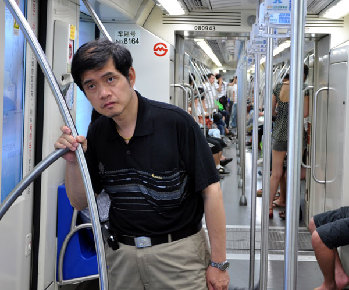|

|
|
Yang Limeng is a metro maintenance worker in Shanghai. |
"Generally speaking, it makes a sustained and reasonable sound and any disagreeable pitch suggests some potential troubles," Yang explained.
In his mind, the noises the metro makes have their own beats just like every song has its unique tempo and rhythm.
"I don't know why but no matter how noisy the environment is, I can always pick up the pattern. And unlike other people, who can quickly adjust themselves to reading newspapers or listening to music, my initial response after stepping into any metro line is to prick up my ears for the sounds," he said.
Cao Shengyun, Yang's supervisor, said less than 10 people in the team of 173 working for Metro Line 8 where Yang is based have such sharp ears.
"Diagnosing according to the sound of the metro is Yang's special skill," he said. "We have all kinds of senior technicians and engineers in the team, but you need to practice for at least 10 years to have such sensitive ears as Yang's."
It has been Yang's habit to pay attention to the sound of the metro since the Shanghai World Expo in 2010, when his company, Shanghai Shentong Metro, asked each member of the technical staff to act as "Shanghai metro's doctor" whenever they have a chance to get a ride.
Yang detected at least two potential troubles on Line 8 using his magic ears in 2010 and 2011.
"I picked up some very faint sounds last summer," he said. "I wasn't sure what caused the problem in the beginning until I walked toward the source from another carriage and waited for the metro to make a turn. It sounded like the discordant ringing of metallic objects."
Yang thought it was something wrong with the metro's twist bar at the bottom of the vehicle. He immediately contacted the dispatcher and suggested recalling the car for further examination and repair.
It turned out that Yang was right.
"The twist bar is there to prevent the metro turning over when it makes a turn at high speed, but it is not supposed to make any noise," said Yang.
Repairing machines has been Yang's lifelong work and hobby.
Having once worked in a local watch factory and then a spinning mill, Yang said he spent his life examining and repairing machines.
"It's sort of my hobby to fix things, no matter if it's as tiny as the workings of a watch or as big as Shanghai's metro, I like to fix it," Yang said.
He is popular at home as well as in his workplace because of his hobby, said Yang's wife Liu Jieqing.
"Our neighbors, friends and colleagues come to him if they break their phones, watches, computers, even small electrical equipment," she said.
The textile mill where Yang worked had just closed when he saw a job posting from Shanghai Metro.
"The metro was still some new mode of transportation for us during the 1990s, but I still gave it a try because I'm good at maintenance," he said.
Yang passed a written examination, face-to-face interview, skill exam and physical exam, which altogether took him more than half a year.
With Shanghai's average daily traffic volume reaching 6,500,000 people, the city's metro system follows its own rigid but efficient system.
"For example, we're requested to report any problem to the group (Shanghai Shentong Metro Group) if we can't fix the car within five minutes sharp, and within 15 minutes the city's government would hear about it," said Yang, explaining why he and his colleagues have to work in shifts to ensure maintenance 24 hours a day.
